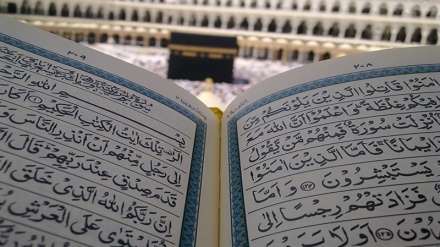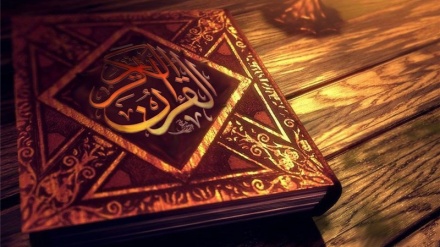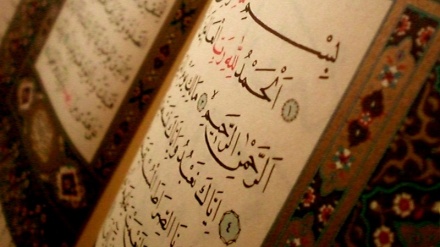Path towards Enlightenment (1013)
Salaam, and welcome to our latest episode of “Path towards Enlightenment”, which is an endeavour to make you and us familiar with an easy and fluent explanation of God’s Final Scripture to all mankind, the holy Qur’an that was revealed to the Last and Greatest of all Messengers, Prophet Muhammad (blessings of God upon him and his progeny).
Today we complete explanation of the six remaining Ayahs of “Surah Taghabun”. As we had said in the last episode of this episode, while alive we should make the best of the opportunity which God has granted us by doing good deeds and abstaining from evil, so as to avoid the great regret of dispossession on the Day of Judgement.
Here we invite you to listen to Ayahs 13 and 14:
“Allah - there is no god except Him - in Allah let all the faithful put their trust.
“O’ you who have faith, indeed among your spouses and children you have enemies! So beware of them, and if you excuse, forbear and forgive, then Allah is most surely All-Forgiving, All-Merciful.”
Certainly, the One and Only Creator of the universe is worthy of worship alone and we should completely put all our trust in Him, since Omnipotence, Omniscience, Ownership and Needlessness solely belong to God Almighty, and every object is in need of Him.
After emphasizing obedience to and complete trust in God Almighty and the Prophet, the next Ayah cautions believers against excessive affection for possessions and families which constitute one of the obstacles in treading the Path of Truth. Thus, believers ought to beware of the ill-advice by spouses and children who are likely to become unwitting enemies for preventing the husband and the head of the household from participating in the good of the community as commanded by God. In such cases, the misconstrued suggestions of the family should be politely overcome, as is evident by the same Ayah which immediately calls for magnanimity through forgiveness of the erring family members and forbearance towards them, since our Loving Creator is All-Forgiving and All-Merciful.
These Ayahs teach us the following points:
- Among the signs of firm faith is putting trust in God Almighty.
- Familial affections should not be an obstacle to the observance of religious duties or participation in the good of the community.
- A true believer maintains balance between emotions at home and obligations in society and in vital personal matters.
- Any ill-advice by spouses and children that makes them unwitting enemies to a good cause should be overcome in a polite way through forgiveness and forbearance.
Now let us listen to Ayahs 15 and 16 of the same Surah:
“Rather your possessions and children are a trial, and Allah - with Him is a great reward!
“So be wary of Allah as far as you can, and listen and obey and spend (in the way of Allah); that is better for yourselves. And those who are saved from their own greed -it is they who are the felicitous.”
Whatever we possess, whether wealth, property, spouses and children, are a trial for us to determine the fulfillment of our obligations, since the great reward for our good deeds is with God Almighty. Children are both an embellishment and a means of trial, since it is the duty of parents to keep emotions within bonds through their proper upbringing and education with emphasis on religious duties and etiquette in order to make them responsible members of the society.
Thus, Ayah 16 emphasizes self-control and refrainment from committing sins by listening to and obeying Divine injunctions and spending for good causes, since it is the awe of God Almighty that keeps us firmly on the right track and saves us from self-conceitedness. Particular emphasis is laid on expending in the Way of God for our own good, since those who save themselves from their own avarice and niggardliness are the ones who are felicitous.
From these Ayahs we learn that:
- Undue attachment to worldly possession and excessive love for children to the extent of failing to groom them in the proper manner bring about disaster in the world and in afterlife, since the actual reward is with God.
- We should be conscious and cognitive of the Almighty Creator at all times by heeding words of righteousness, fulfilling obligations, and spending in His way, since the world and whatever we possess are a trial.
- Greed and niggardliness ought to be avoided at all times in order to achieve the bounties and felicities promised by God.
In conclusion of this week’s episode of Path towards Enlightenment, here are Ayahs 17 and 18 which mark the end of Surah Taghābun:
“If you lend Allah a good loan, He shall multiply it for you and forgive you, and Allah is All-Appreciative, All-Forbearing,
“Knower of the Unseen and the Sensible (He is), the Invincible, the All-Wise.”
Ayah 17 stresses the way of salvation through spending in the way of Allah, Who calls charity as a loan to Him with the promise of forgiveness and multiplying of whatever we spend for good causes, in view of the fact that there is no better one to appreciate our virtuous deeds than our All-Merciful Loving Creator. In words, solving the problems of others is beneficial for all and brings about eternal bliss in the Hereafter.
The next Ayah reminds us of the Infinite Power of the Almighty Creator Who is aware of each and everything, and is nearer to us than our own jugular vein.
These Ayahs teach us that:
- Almighty Allah is the Source of all bounties and whatever He has given us is meant as a trial to determine how we spend in His way to earn the promised rewards by resolving the problems of others.
- None is more appreciative of our good deeds than our own All-Merciful Creator, Who grants us greater rewards, and is aware of each and every thing including whatever we secretly provide to the needy.
Goodbye and God help until we meet again with explanation of the next Surah.
RM/AS/SS


